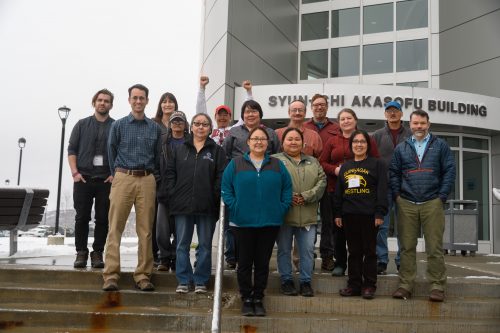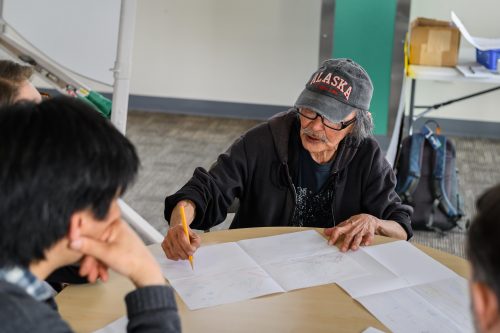Workshop helps coastal communities plan for climate change
May 3, 2019

Fourteen representatives from five Alaska tribes traveled to Fairbanks for a three-day knowledge-sharing workshop on a topic they are reckoning with daily: climate change.
The Looking Forward, Looking Back: Building Resilience Today workshop series, hosted by the Alaska Climate Adaptation Science Center and the Aleutian Pribilof Islands Association in mid-April, aims to provide Alaska tribal communities who are at the forefront of climate change with the tools to plan and adapt for uncertain futures.
Jerilyn Kelly, the mayor of Quinhagak, was looking for a way to get a head start on climate adaptation planning for her community. The request for representative leadership teams made up of city, tribal and corporation members piqued her interest.
“There are not many opportunities for municipalities and especially corporations to get information on climate change,” Kelly says.
“With the people represent as our focal point, we can put our differences aside and collaborate toward a better future,” says Kelly.
Already, these communities are managing the loss of traditional hunting and gathering grounds, damage to infrastructure, and dangerous spring conditions that impede travel. As erosion eats away at their shores and smoke from wildfires impacts community health, they are coming together to share solutions and learn about tools available to them. The knowledge shared during these workshops, both from climate experts and their fellow communities around the state, they will take back and present to their communities.
Scientists studying climate projections, scenarios, policy, and responses spoke to the group and had the opportunity to hear from the people witnessing the changes they study.
Today’s extremes will not be tomorrow’s extremes,” says Rick Thoman, Alaska climate specialist with the Alaska Center for Climate Assessment and Policy.
As Thoman shared trends and projections in temperature, permafrost and more across the state, he painted a picture of a future when events considered atypical today, such as the decrease in sea ice in the Bering Sea, may be the norm. Conditions once relied upon as normal, like winter travel across frozen landscapes, may be rare in the future. It’s a nearly unimaginable change for communities watching it happen before their eyes.

Participants illustrated the impacts they are noticing in their home communities through a series of visual exercises. Drawing changes to familiar landscapes and mapping connections from drivers of change to impacts helps facilitate knowledge sharing and a personal connection to climate change, and are also valuable tools participants can use with their community members at home to relay the information.
The workshop also covered how institutions and nations are facing climate change on a global scale. Defining the Arctic and Alaska’s role in it is an important conversation for rural communities to participate in.
“We might see the Arctic as one way, but the rest of the world who are making decisions about emissions might be thinking another way,” said Malinda Chase, a tribal liaison to the Alaska Climate Adaptation Science Center.
“We hope that by combining traditional knowledge with the latest western science into a useable format, these communities will be able to draw on the results of these workshops with meaningful results for their communities,” said ACASC scientist Ryan Toohey. Following the initial meeting in Fairbanks, the workshop organizers will travel to each community individually to help them synthesize traditional knowledge and identify important subsistence species and areas for the tribe. The series will culminate with a final meeting in Fairbanks this fall.
For more information about this workshop, email Malinda Chase at malindac@apiai.org.


